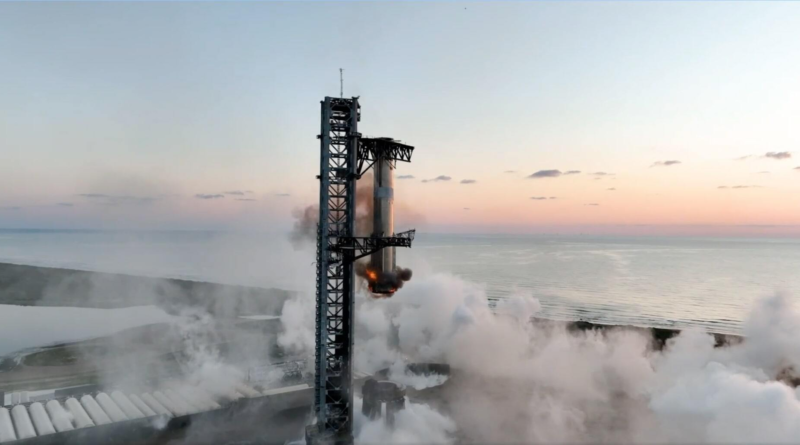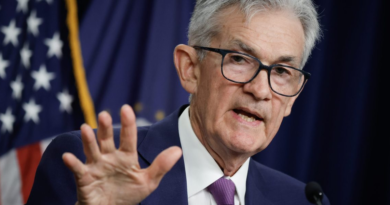SpaceX’s launch this weekend will reshape the space industry
I got goosebumps as I watched the SpaceX Starship booster slide into place, caught by the robotic arms of the launch tower. It was the first time SpaceX had attempted to land its Starship booster like this—an engineering feat initially suggested by Elon Musk that we only just learned was truly possible on Sunday. The livestream showed employees at SpaceX’s California HQ roaring with joy, arms raised and jumping up and down as if at a concert.
Delian Asparouhov, cofounder of Varda Space Industries and a partner at Founders Fund, one of the first venture firms to back SpaceX, was giddy as he recounted his Sunday morning, drinking coffee as he witnessed the landing via livestream.
It was “as fundamental of a leap forward as the first year of the Falcon 9 landing,” Asparouhov told me. “It’s just a clear pointer to a fundamental net new era in space flight, right?”
This was a historic flight for SpaceX, the venture capital world’s second most valuable startup. The booster landing was a huge step in proving that the Starship Super Heavy rocket can be reused, offering assurance that SpaceX will be able to send heavier payloads into orbit for customers, ship its own second, larger version of SpaceX’s own Starlink satellites into the skies, and eventually transport dozens of people at once into space.
SpaceX’s novel approach to catching the booster with what it called the “chopstick” arms is intended to allow the company to conduct launches quickly and to catch the booster on the uneven terrain of other planets. There’s a way to go before that becomes a reality, but Sunday’s successful test already catapults SpaceX far ahead of competitors like Blue Origin, whose mega-rocket New Glenn has yet to do a test flight; or Relativity Space’s Terran R, which is still in development.
Today, anyone who wants to send something into orbit—whether a company with a satellite to deploy, or a scientist who wants to send a probe or telescope for their studies—has to use expensive, light materials. Even SpaceX’s workhorse rocket, the Falcon 9, which was responsible for SpaceX doing 90% of U.S. launches in 2023, can’t carry more than 50,265 pounds to low earth orbit when its booster is reused. By contrast, the Starship, once in operation, will be able to carry up to 150 tons on a reusable rocket, or 250 tons on an expendable one.
“Starship will completely change what’s optimal for spacecraft design,” Karan Kunjur, the CEO of satellite startup K2 Space, wrote me in an email. Kunjur pointed out how his company, which has already started building mega satellites that will benefit from bigger rockets like Starship, will be able to deploy satellites with higher power and larger antennas that can give houses in rural areas better internet throughput and service, and that K2 Space will ultimately be able to use heavier, lower cost materials to build them.
Founders Fund’s Asparouhov expects a shift in what venture investors will be willing to write a check for, now that founders can set a roadmap that fits within their investment horizons. “The idea that somebody could land something that’s a multi-ton object on the moon is something that is actually viable in the timeframe that matters to investors,” he says, adding: “I’m not sure that we were totally ready to start to realistically underwriting business models that were dependent on Starship. Now it feels much more reasonable to do so,” he says.
SpaceX has been talking about its big plans for Starship for years: long-duration flights in between planets, developing a Moon base, and even point-to-point transit here on Earth.
We’re still likely years away from all that, as Starship has more test flights to go (including a sixth test expected later this year) before it is incorporated into SpaceX’s launch fleet. But SpaceX just laid the groundwork for all of it, and it’s pretty cool to see history in the making.
By the way…There’s been tons of interesting discussions at Fortune’s Most Powerful Women conference, in Laguna Niguel, Calif. Yesterday a16z’s Katherine Boyle and Nini Hamrick, cofounder and president of Vannevar Labs, weighed in on defense tech. I wrote about the conversation here.
See you tomorrow,
Jessica Mathews
Twitter: @jessicakmathews
Email: jessica.mathews@fortune.com
Submit a deal for the Term Sheet newsletter here.
Clarification: The online version of this newsletter has been updated to clarify that K2 Space’s satellites will benefit from, but don’t depend on, bigger rockets like Starship.
Nina Ajemian curated the deals section of today’s newsletter.
VENTURE DEALS
– Decagon, a San Francisco-based AI customer support agents developer, raised $65 million in Series B funding. Bain Capital Ventures led the round and was joined by Elad Gil, A*, Accel, and others.
– Oshi Health, a New York City-based digestive healthcare provider, raised $60 million in Series C funding. Oak HC/FT led the round and was joined by existing investors Bessemer Venture Partners, Flare Capital Partners, Frist Cressey Ventures, and others.
– Galileo, a San Francisco-based enterprise GenAI evaluation and observability platform, raised $45 million in Series B funding. Scale Venture Partners led the round and was joined by Premji Invest.
– Neuron7.ai, a Santa Clara, Calif.-based resolution accuracy platform, raised $44 million in Series B funding. Smith Point Capital led the round and was joined by Nexus Venture Partners and Battery Ventures.
– Azra Games, a Sacramento-based mobile role-playing games developer, raised $42.7 million in Series A funding. Pantera Capital led the round and was joined by a16z crypto, A16Z GAMES, and NFX.
– Port, a Tel Aviv-based internal developer portals creation platform, raised $35 million in Series B funding. Accel led the round and was joined by Bessemer Venture Partners, existing investors Team8, TLV Partners, and others.
– Everstage, a New York City-based sales commissions management platform, raised $30 million in Series B funding. Eight Roads Ventures led the round and was joined by existing investors Elevation Capital and 3one4 Capital.
– Monogoto, a Los Angeles-based software-defined connectivity solutions provider, raised $27 million in Series A funding. Toyota Ventures led the round and was joined by Samsung Next, The ACTIVE Fund, Assembly Ventures, existing investors Triventures, Singtel Innov8 Ventures, and others.
– Towns, a Brooklyn-based on-chain messaging platform, raised $25.5 million in Series A funding from Andreessen Horowitz, Benchmark, and Framework.
– Bitnomial, a Chicago-based digital asset derivatives exchange company, raised $25 million in Series C funding. Ripple led the round and was joined by others.
– DeNexus, a Boston-based end-to-end cyber risk management provider for industrial networks, raised $17.5 million in Series A funding. Punja Global Ventures led the round and was joined by AXA XL, Prosegur/SegTech, and HCS Capital.
– Fin, a London-based sustainable logistics provider, raised $7 million in seed funding. MaC Venture Capital led the round and was joined by Side Door Ventures, Pearls Capital, and Simplex Ventures.
– Predicate, a New York City-based transaction prerequisites network, raised $7 million in funding. 1kx and Tribe Capital led the round and were joined by Reciprocal Ventures, Hashkey Capital, White Star Capital, angel investors, and others.
– Early, a Tel Aviv-based generative AI code quality platform, raised $5 million in seed funding. Zeev Ventures led the round and was joined by Dynamic Loop Capital.
– Deck, a Montreal-based utility data access platform, raised $4.5 million in seed funding. Golden Ventures and Better Tomorrow Ventures led the round and were joined by Luge Capital.
– Strella, a New York City-based customer research automation and acceleration AI platform, raised $4 million in seed funding. Decibel led the round and was joined by Unusual Ventures.
– sallea, a Zurich, Switzerland-based cultivated meat and fish products technology developer, raised $2.6 million in pre-seed funding. Founderful led the round and was joined by Kost Capital.
PRIVATE EQUITY
– Allied Industrial Partners acquired a majority stake in JCL Energy, a Sharon, Pa.-based transformer distribution company. Financial terms were not disclosed.
– ARCHIMED acquired FIM Medical, a Lyon, France-based occupational health medical device company. Financial terms were not disclosed.
– Blackford Capital acquired Empire Distributing, an Arcade, N.Y.-based hearth and outdoor living products distributor. Financial terms were not disclosed.
– NewSpring acquired Xpect Solutions, a Fairfax, Va/-based enterprise IT and security solutions provider to government agencies. Financial terms were not disclosed.
– Shermco Industries, backed by Gryphon Investors, acquired KTR Associates, a Sinking Spring, Pa.-based power system engineering company. Financial terms were not disclosed.
– Sonar, backed by Advent International and others, acquired Structure101, a Dunmore East, Ireland-based code structure analysis provider. Financial terms were not disclosed.
– Syntax Systems, a portfolio company of Novacap, acquired Argon Supply Chain Solutions, a Cape Town-based warehouse management and supply chain optimization solution provider. Financial terms were not disclosed.
EXITS
– Leeds Equity Partners acquired OffSec, a New York City-based cybersecurity workforce development training and education provider, from Spectrum Equity. Financial terms were not disclosed.
– Sodalis Group acquired HRB Brands, a Westport, Conn.-based hair care and skin cleansing business, from Tengram Capital Partners. Financial terms were not disclosed.
OTHER
– ADP acquired WorkForce Software, a Livonia, Mich.-based workforce management solutions provider. Financial terms were not disclosed.
– Havenly Brands acquired Burrow, a New York City-based furniture design brand. Financial terms were not disclosed.
IPOS
– Ingram Micro Holdings, an Irvine, Calif.-based IT solutions distributor, plans to raise $427.8 million in an offering of 18.6 million shares priced between $20 and $23 on the NYSE. The company posted $47.8 billion in revenue for the year ending June 30, 2024. Platinum Equity backs the company.
FUNDS + FUNDS OF FUNDS
– 20VC, a London-based venture capital firm, raised $400 million for its new fund focused on early-stage tech companies.
– CID Capital, an Indianapolis-based private equity firm, raised $250 million for its fourth fund focused on lower middle market buyouts in the services and industrials spaces.
– KdT Ventures, an Austin-based venture capital firm, raised $100 million for its fourth fund focused on the therapeutics, digital health, industrial biotechnology, climate, and other science sectors.
– node.vc, a Stockholm-based venture capital firm, raised €71 million ($77.4 million) for its new fund focused on tech companies.
PEOPLE
– Advent International, a Boston-based private equity firm, added Vivek Sharma as a senior advisor. Previously, he was at InStride.
– KdT Ventures, an Austin-based venture capital firm, promoted Phil Grayeski to managing partner and Patrick Malone to partner.




